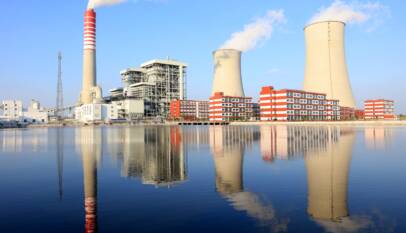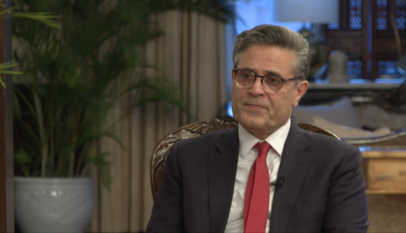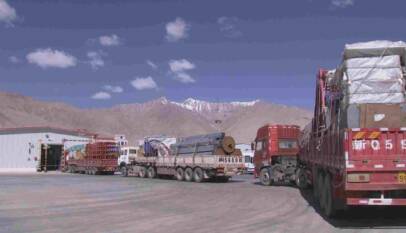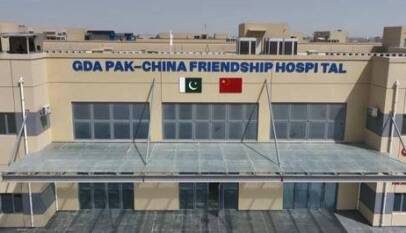China’s Resolve for Peace & Development, Hosts Baloch Delegation in Beijing
China hosted a dialogue between Baloch leaders representing major political parties, and members of Chinese Academia and expert in Beijing. Seminar aimed to eliminate misconceptions among Baloch people regarding CPEC and China’s role in the development of the province. The delegation comprising Baloch senator, party leaders, and provincial ministers was hosted by China Association for Friendship (CAF). Chen Shoaxin, Secretary-General CAF remarked that hosting Baloch leaders shows China’s pursuit of peace and inclusive growth. Baloch leaders had a collective message that Balochistan wants inclusive development in consultation with Baloch stakeholders. They suggested that involvement of youth in CPEC Projects, investment in health and education sectors and quota for Baloch students in Chinese academic scholarships will help build the ownership of CPEC among the community. CAF’s Pakistani partner the Centre for Research and Security Studies (CRSS) vowed to create greater awareness among Baloch people about the win-win situation that China has offered with CPEC.
China’s capital Beijing on Tuesday hosted a rare heart-to-heart exchange of views among Baloch leaders representing different parties and Chinese academia and experts.
The focus was the Balochistan situation as well the status of CPEC related projects in the province and the perceptions about China’s role in the development of the province under the Belt and Road Initiative (BRI). The collective message by the visiting leaders was; CPEC will grow if Balochistan grows.
The delegation, currently visiting China on the invitation of the China Association Friendship (CAF), comprises Senator, Dr Jehanzeb Jamaldini, secretary general of the Balochistan National Party (BNP), Agha Hassan Baloch, MNA (BNP), Mir Naseebullah Khan Marri, provincial health minister, Dr Ishaq Baloch (National Party), and Syed Ehsan Shah , former minister of finance Pakistan National Party (PNP).
The Secretary General of the host organization CAF, Mr Chen Shaoxin, welcomed the Baloch leaders, mostly from Baloch nationalist parties, and said their presence in the capital underlined China’s sincere desire to pursue peace and development in an inclusive and collaborative way for the benefit of everybody. We want the Baloch people to benefit from CPEC as much as the rest of Pakistan, which remains a real all-weather trusted friend. We must all join hands to create a Win-Win situation for all.
On their part, Baloch leaders highlighted issues such as exclusion of Baloch from decision-making, key positions, pockets of economic backwardness and dismal state of infrastructure in most parts of Balochistan. They also underscored the need for taking Baloch leadership as well as tribal cultural sensitivities of the tribes into consideration too.
The China Friendship Association (CAF) is one of the most influential arms of the Chinese outward diplomacy for international outreach and is eager to address reservations or misunderstandings that some Baloch leaders may have on CPEC related development work in their province.
Members of the Baloch delegation also said greater transparency and inclusion of community stakeholders in all Balochistan-based CPEC projects will create ownership of the development efforts. An inclusive approach will also take care of the security issues and automatically create a protection shield by the community itself.
They also devolved on the social dynamics of the Baloch society and told the audience that Baloch are liberal and peaceful people and would love to contribute to the development projects. But if the youth don’t get jobs it will be easy for religious radicals elements and the enemies of Pakistan to recruit them for terrorist activities, said Dr Jehanzaib Jamaldini, general secretary of the Balochistan National Party (BNP).
One of the issues that resonated during the conversation was a general complaint of exclusion of Baloch stakeholders from issues related to Balochistan, including CPEC projects also resonated in the seminar.
Mistrusts and complaints come from a long history of negligence and exclusion as main strategies for Balochistan have traditionally been made in Islamabad, said Dr.Baloch.
China should also prioritise health and education infrastructure in all the key districts to address the acute social sector backwardness, Mir Naseebullah Khan Marri, the provincial minister for health said.
Dedicated education scholarships, skill development opportunities in China as well as in Balochistan, and job quota for Baloch youth are some of the instruments that can help neutralise misperceptions surrounding CPEC.
The Baloch delegation, moderated by CAF’s Pakistan partner, the Centre for Research and Security Studies (CRSS), reassured the Chinese hosts to create greater awareness among Baloch people about the win-win situation that Chinese friends are creating through the CPEC. It will help remove misperceptions as well as negative rumours around the role of China in Balochistan.
Terrorism against Chinese interests, violence against civilian and military forces and negative propaganda is part of a new cold war between the two major economic powers of the world, Syed Ehsan Shah pointed out in response to questions as to why Chinese interests were being attacked in Pakistan. We have to face and fight it together.
Baloch leaders informed the Chinese hosts that criticism of China or opposition to CPEC by some radical groups does not represent the general socio-political sentiment of Baloch people. All they want is inclusive development in consultation with Baloch stake-holders. That will create a community ownership of the entire process, they said . If all three major stakeholders – Pakistan’s central government, provincial government and the Chinese – could engage in a regular, institutional consultative framework that could not only push development in Balochistan but also neutralize neutralise forces.
Gwadar Pak-China Friendship Hospital pioneers laser-assisted bladder stone surgery
China-aided Gwadar Pak-China Friendship Hospital has debuted in conducting an operation to…









